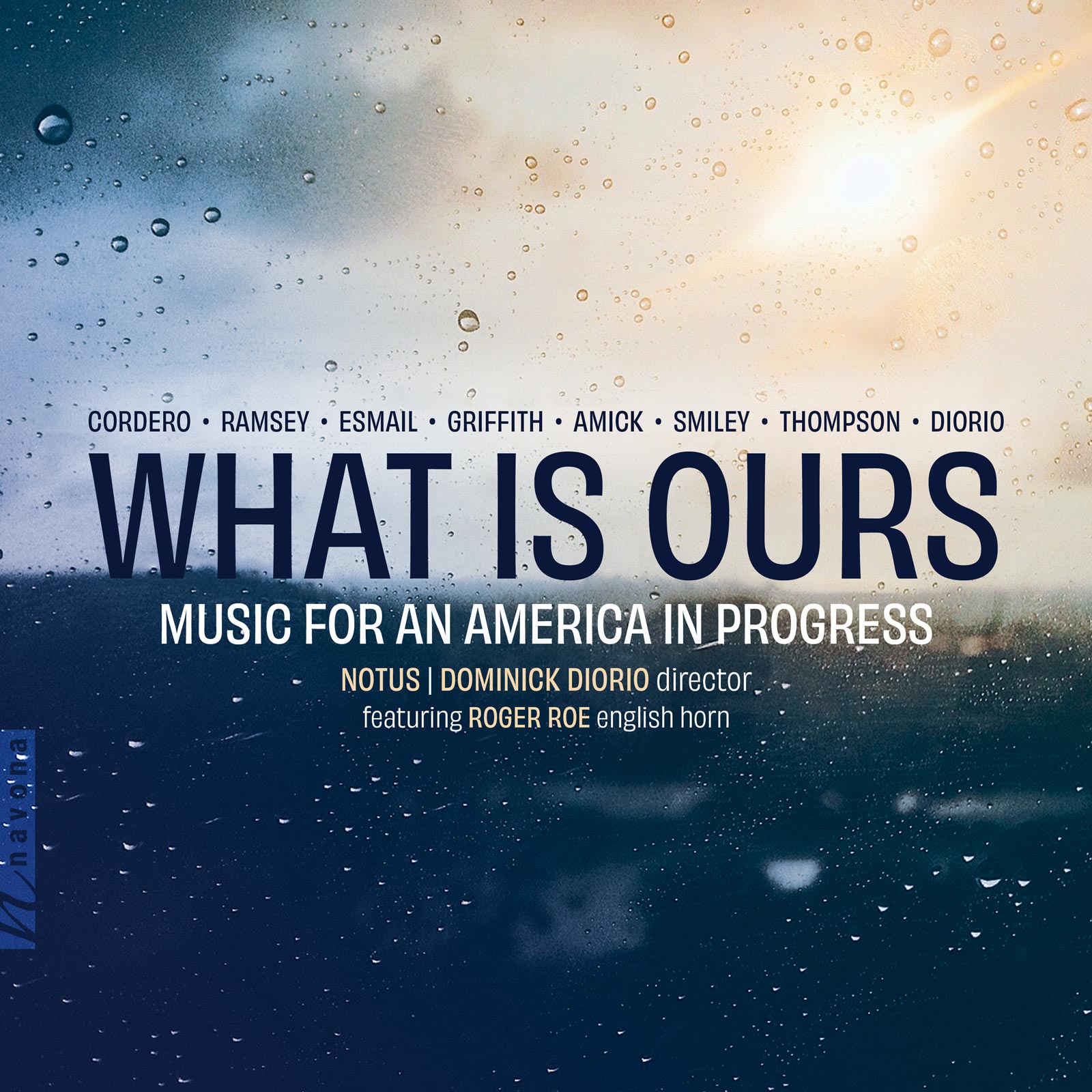What Is Ours
Carlos Cordero composer
Andrea Ramsey composer
Reena Esmail composer
John William Griffith II composer
Leigha Amick composer
Moira Smiley composer
Joel Thompson composer
Dominick DiOrio composer
NOTUS | Dominick DiOrio director
Roger Roe English horn
There are generally two ways one can face a crisis. One can give up, or one can persevere and use it to one’s advantage. Choir director Dominick DiOrio definitely chose the latter during the pandemic, turning his reflections and sentiments about it into a profoundly engaging, almost philosophical choral album titled WHAT IS OURS. DiOrio conjures a formidable cross-section of music by a range of contemporary composers that not only reflects the diversity and multiplicity of modern-day America, but also its underbelly of struggle, challenge, and an eventual triumph of humanity.
Listen
Stream/Buy
Choose your platform
Track Listing & Credits
| # | Title | Composer | Performer | |
|---|---|---|---|---|
| 01 | ¡Ayúdame! (Venezuelan Plea for Life) | Carlos Cordero | NOTUS | Dominick DiOrio, director; Robert Darling, bass drum | 5:09 |
| 02 | Stomp on the Fire | Andrea Ramsey | NOTUS | Dominick DiOrio, director | 2:53 |
| 03 | Tuttarana | Reena Esmail | NOTUS | Dominick DiOrio, director | 3:02 |
| 04 | first light | John William Griffith II | NOTUS | Dominick DiOrio, director; Luke Acerra, cello | 8:11 |
| 05 | Night Sky Songs: I. The Dark | Leigha Amick | NOTUS | Dominick DiOrio, director; Jenna Kreider, soprano; Liz Culpepper, mezzo-soprano | 4:25 |
| 06 | Night Sky Songs: II. The Other Side of the Valley | Leigha Amick | NOTUS | Dominick DiOrio, director; Jenna Kreider, soprano; Liz Culpepper, mezzo-soprano | 5:28 |
| 07 | It Takes Your Breath Away | Dominick DiOrio | Roger Roe, English horn | 9:06 |
| 08 | Wire You Here | Moira Smiley | NOTUS | Dominick DiOrio, director; Elizabeth Queen, soprano; Nicholas Sienkiewicz, tenor; Erina Buchholz, violin; Ursula Steele, viola; Andrew Johnson, cello; Robert Darling, percussion | 3:35 |
| 09 | America Will Be! | Joel Thompson | NOTUS | Dominick DiOrio, director; Chase Sanders, soprano; Deepa Johnny, mezzo-soprano | 5:48 |
| 10 | A Chain is Broken | Dominick DiOrio | NOTUS | Dominick DiOrio, director; Nicholas Stevens, tenor; Erina Buchholz, violin; Rees Taylor Roberts, piano | 5:07 |
NOTUS Roster, January 2022 (Tracks 1-3 & 8-10)
Jessica Bittner; David Boeckh; Jillian Boes; Elijah Buerk; Jake Cozza; Sara Dailey; Andrew Durham; Seare Farhat; Samuel Grace, assistant conductor; Kate Hamori; Catarine Hancock; Kira Hanger; Deepa Johnny; Hunter T. Johnson; Peter Kadeli, assistant conductor; Alex Koppel, assistant conductor; Shannon Lally; Zac Leung; Caio Lopes, assistant conductor; John Morrow; Matthias Murphy; Kathryn Peterson; Marcus Peterson; Howell Petty; Biana Pinchuk; Elizabeth Queen; Rees Taylor Roberts, rehearsal pianist; Lilian Rona; Chase Sanders; Nicholas Sienkiewicz; Eirene Stavropoulos; Nicholas Stevens; Kahan Taraporevala; Sergey Tkachenko; Alexander Toth; Savanna Webber
NOTUS Roster, February 2020 (Tracks 4-6)
Lawrence Abernathy, assistant conductor, Night Sky Songs soloist; Hayley Abramowitz, Night Sky Songs soloist; Anna Ambartsumian; Leigha Amick; Charles Banta; Jessica Bittner, Night Sky Songs soloist; Katherine Bodor; Jillian Boes, Night Sky Songs soloist; Elijah Bowen, Night Sky Songs soloist; Josh Catanzaro; Michael Colman; Jake Cozza; Liz Culpepper, Night Sky Songs soloist; Christina Dragnea, Night Sky Songs soloist; Anthony Ferreira; Karli Forte, first light soloist; Katie Gardiner, assistant conductor; John William Griffith II; Katherine Holobinko, first light soloist; Lauren Jewell; Ryn Jorgensen; Noah Klein
Jenna Kreider, Night Sky Songs soloist; Matthew Li; Rebecca Luppe, rehearsal pianist; Amane Machida; Brandon Magid; Sam Mathis, first light soloist; Jack Pellegrini; Deanna Pellerano; Marcus Peterson; Matt Ridge; Jeff Sabol; Brandan Sanchez; Cheng Tang; Eli Tash; Natasha Viener; Sarah Ward, Night Sky Songs soloist; Jesse Warren
Tracks 1-3, 8-10 (recorded with singers in masks)
Recorded January 29, 2022 at Ione B. Auer Concert Hall, Indiana University Jacobs School of Music, in Bloomington IN
Producers D. James Tagg, Dominick DiOrio
Mixing, Mastering & Lead Audio Engineer D. James Tagg
Assistant Audio Engineers Kevin Shima, Han-Wei Hsing, Grace Leckey
Tracks 4-6 (recorded without masks)
Recorded February 22, 2020 at Ione B. Auer Concert Hall, Indiana University Jacobs School of Music, in Bloomington IN
Producers D. James Tagg, Dominick DiOrio
Mixing, Mastering & Lead Audio Engineer D. James Tagg
Assistant Audio Engineers Jozef Caldwell, Heoliny Jung
Track 7
Recorded May 20, 2022 at Ione B. Auer Concert Hall, Indiana University Jacobs School of Music, in Bloomington IN
Producers D. James Tagg, Dominick DiOrio
Mixing, Lead Audio Engineer D. James Tagg
Mastering D. James Tagg
It Takes Your Breath Away
Poetry reading by Margie McCreless Roe
Additional spoken voices contributed by Gordon, Patsy, Karen, Russell, Lou, Theo, and Roger Roe
Wire You Here
Spoken reflections were recorded individually and contributed voluntarily by Hayley Abramowitz, Leigha Amick, Jessica Bittner, Katherine Bodor, Jillian Boes, Michael Colman, Liz Culpepper, Karli Forte, John William Griffith II, Lauren Jewell, Ryn Jorgensen, Rebecca Luppe, Amane Machida, Moira Smiley
Permissions
Texts for Tracks 1, 2, 3 and 8 were created by and copyright to the individual composers respectively, and they are used here with their permission.
Text for Track 7 by Margie McCreless Roe and excerpted from No Season for Silence: Texas Poets and Pandemic, Copyright © 2020 Kallisto Gaia Press. All rights reserved and used with permission.
Original text for Track 10 © Copyright 2019 Khashayar Tonekaboni. All rights reserved and used with permission.
Executive Producer Bob Lord
A&R Director Brandon MacNeil
A&R Jacob Smith
VP of Production Jan Košulič
Audio Director Lucas Paquette
VP, Design & Marketing Brett Picknell
Art Director Ryan Harrison
Design Edward A. Fleming, Morgan Hauber
Publicity Patrick Niland
Artist Information

NOTUS
Winner of The American Prize in Choral Performance (2019), NOTUS is one of the country’s most unique collegiate vocal ensembles, with a singular commitment to championing living composers through the commissioning, programming, and recording of new works. Directed by conductor-composer Dominick DiOrio and a curricular ensemble at the Indiana University Jacobs School of Music, NOTUS has performed across the nation, from regional and national ACDA conferences to Carnegie Hall. In September of 2018, NOTUS released their first commercial album on the Innova label, NOTUS: Of Radiance and Refraction, which includes five world premiere recordings by IU faculty composers. NOTUS was honored to be one of only 24 choirs in the world invited to perform at the 12th World Symposium on Choral Music before it was canceled due to the pandemic. As part of the honor of being invited to the Symposium, NOTUS was named an IFCM Ambassador in 2022 by the International Federation for Choral Music.
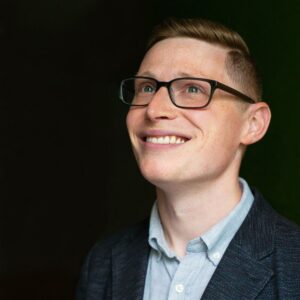
Dominick DiOrio
Dominick DiOrio (b. 1984) is a conductor and composer who has won widespread acclaim for his contributions to American music. He has been recognized with The American Prize in both Choral Composition (2014) and Choral Performance (2019, with NOTUS). Since 2012, he has been a member of the choral conducting faculty at the Indiana University Jacobs School of Music, where he serves as Professor of Choral Conducting and leads the select, new-music chamber chorus NOTUS. DiOrio has conducted ensembles around the world, from the Houston Chamber Choir and Choral Arts Initiative in the United States to Allmänna Sången and Ars Veritas abroad. In July 2020, he became the 14th Artistic Director & Conductor of the Mendelssohn Chorus of Philadelphia.

Roger Roe
Roger Roe is adjunct associate professor of oboe and English horn at the Indiana University Jacobs School of Music. Active as a performer in chamber, recital, and orchestral settings, he has served as English horn and assistant principal oboe of the Indianapolis Symphony Orchestra (ISO) since 1995, following positions with the orchestras of Honolulu HI, and Charleston SC. His many students have gone on from IU to perform in orchestras and other ensembles around the world as well as to careers in many other fields.

Carlos Cordero
Hola, People! My name is Carlos Cordero. I am a new choral music advocate, composer, hug-giver, and singer with a crazy mind. My passion for new choral music and connecting with others has led me to create meaningful experiences and relationships, including recently writing “Holding Our Breath” with poet Julie Flanders commissioned by ACDA’s Genesis Prize. I love writing music for choirs, which is why I created my brand The Happy Choir. Recent commissions include Chorus Austin, Salt Lake Vocal Artists, Ensemble Companio, Panoramic Voices, among others. I also write for instruments, just less often! My pieces have traveled around the world, including America, Europe, and Asia, allowing me to grow as an artist and collaborate with amazing communities.
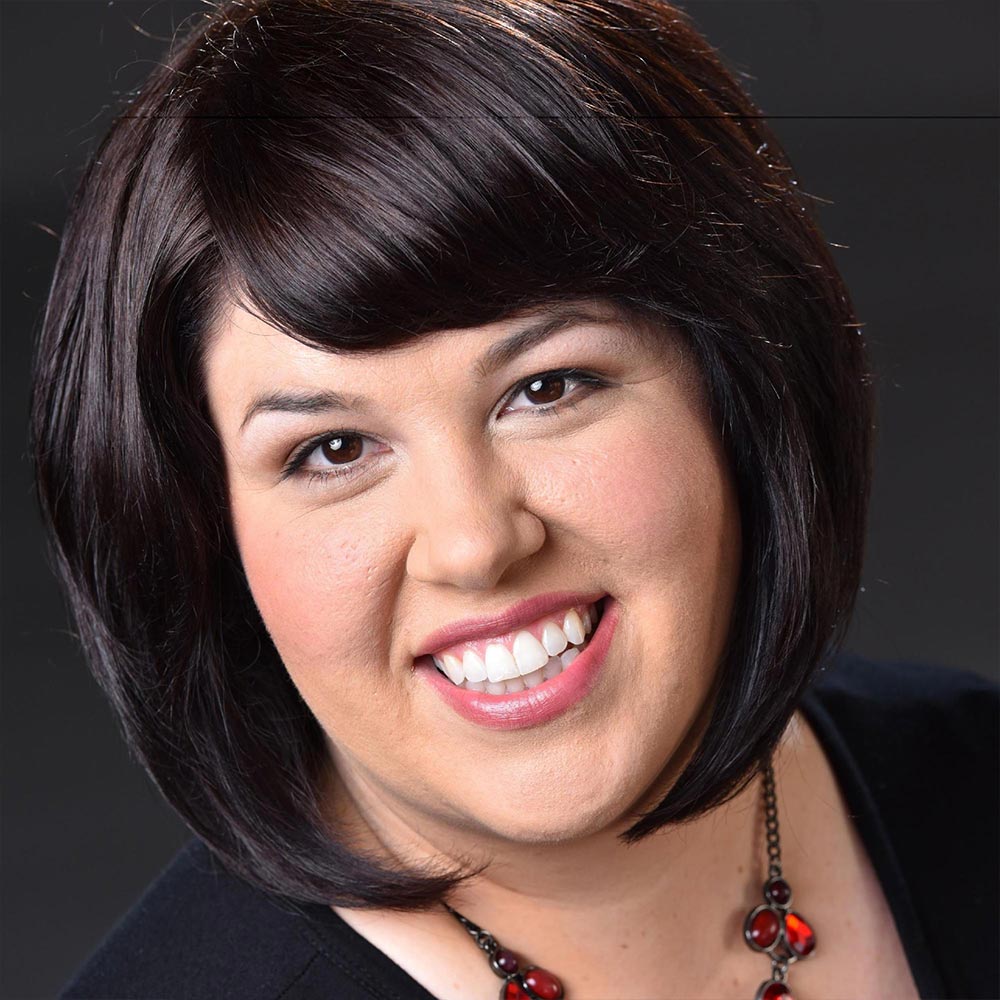
Andrea Ramsey
Andrea Ramsey enjoys an international presence as a composer, conductor, scholar, and music educator. Her teaching experiences range from work with adolescent and children’s voices to high school and collegiate voices. She enjoys regular opportunities to conduct all-state and divisional level honor choirs, festival events at Carnegie Hall, and serves as a principal conductor for the Pacific International Young Women’s Choral Festival in Eugene OR. Before leaping into full time composing and guest conducting, Ramsey held positions in music education and conducting at Ohio State University and the University of Colorado, respectively. An ASCAPlus award-winning composer, Ramsey believes strongly in the creation of new works.
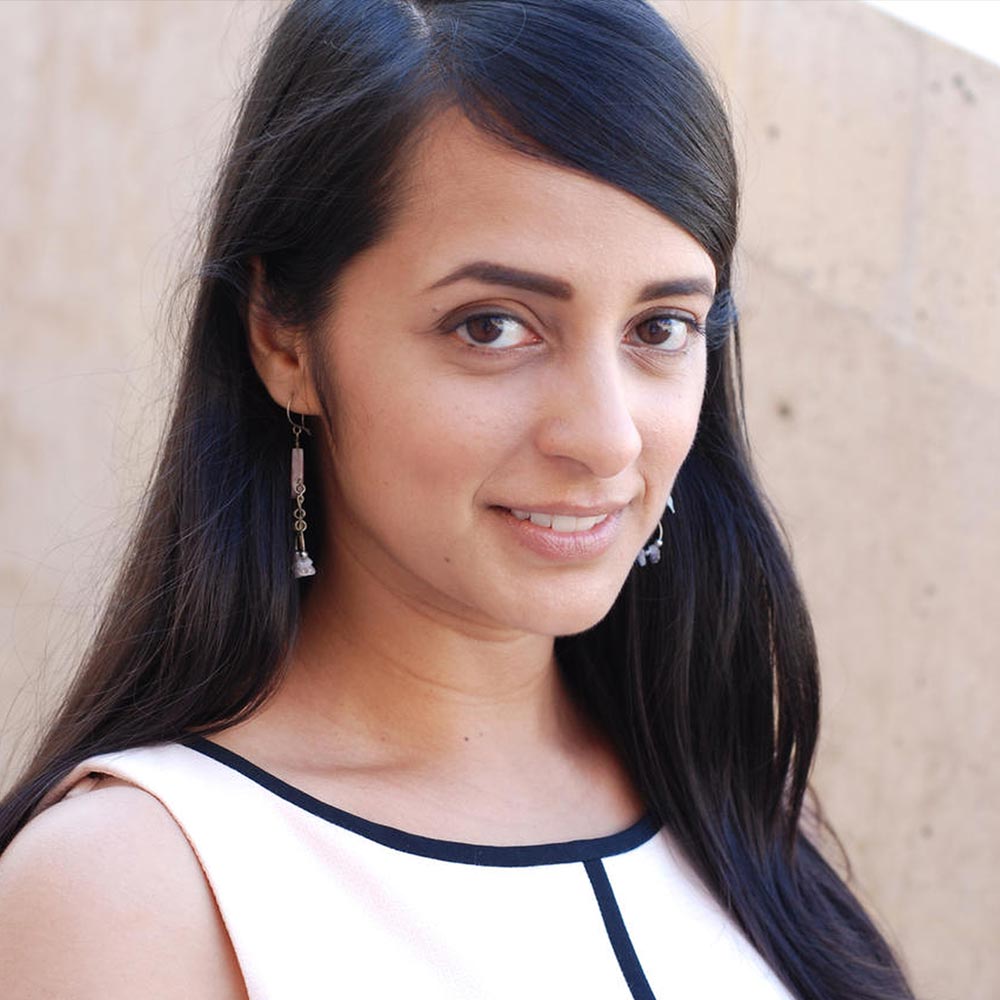
Reena Esmail
Indian-American composer Reena Esmail works between the worlds of Indian and Western classical music, and brings communities together through the creation of equitable musical spaces. Esmail’s life and music was profiled on Season 3 of PBS Great Performances series Now Hear This, as well as Frame of Mind, a podcast from the Metropolitan Museum of Art. Esmail divides her attention evenly between orchestral, chamber and choral work. She has written commissions for ensembles including the Los Angeles Master Chorale, Seattle Symphony, Baltimore Symphony Orchestra and Kronos Quartet, and her music has featured on multiple Grammy-nominated albums, including The Singing Guitar by Conspirare, BRUITS by Imani Winds, and Healing Modes by Brooklyn Rider. Many of her choral works are published by Oxford University Press. Esmail is the Los Angeles Master Chorale’s 2020-2025 Swan Family Artist in Residence, and was Seattle Symphony’s 2020-21 Composer-in-Residence. She also holds awards/fellowships from United States Artists, the S&R Foundation, the American Academy of Arts and Letters, and the Kennedy Center.

John William Griffith II
John William Griffith II (b. 1997) is a composer from South Bend IN. His music has been described as “celebratory, expressive of a party, of life being enjoyed” (Bloomington Herald-Times). A composer, pianist, and conductor, Griffith is a 2020 graduate of the Jacobs School of Music at Indiana University. He is currently pursuing a masters degree in music composition at the Royal College of Music, London. Griffith began composition lessons with Jorge Muñiz in 2014 at Indiana University South Bend. At IU Bloomington, his primary mentors included Don Freund, Claude Baker, and Aaron Travers. He studied choral and opera composition with the late Sven-David Sandström, film scoring with Larry Groupé, and sang as a tenor in the NOTUS Contemporary Vocal Ensemble directed by Dominick DiOrio. In 2017, Griffith was commissioned by the IU Cinema to compose an original score for the 1926 silent film The Strong Man, for which he conducted the live-to-picture performance with a 14-piece ensemble. He was awarded first prize in the 2020 NOTUS Composition Competition, with his piece first light premiered by the ensemble in February of that year.
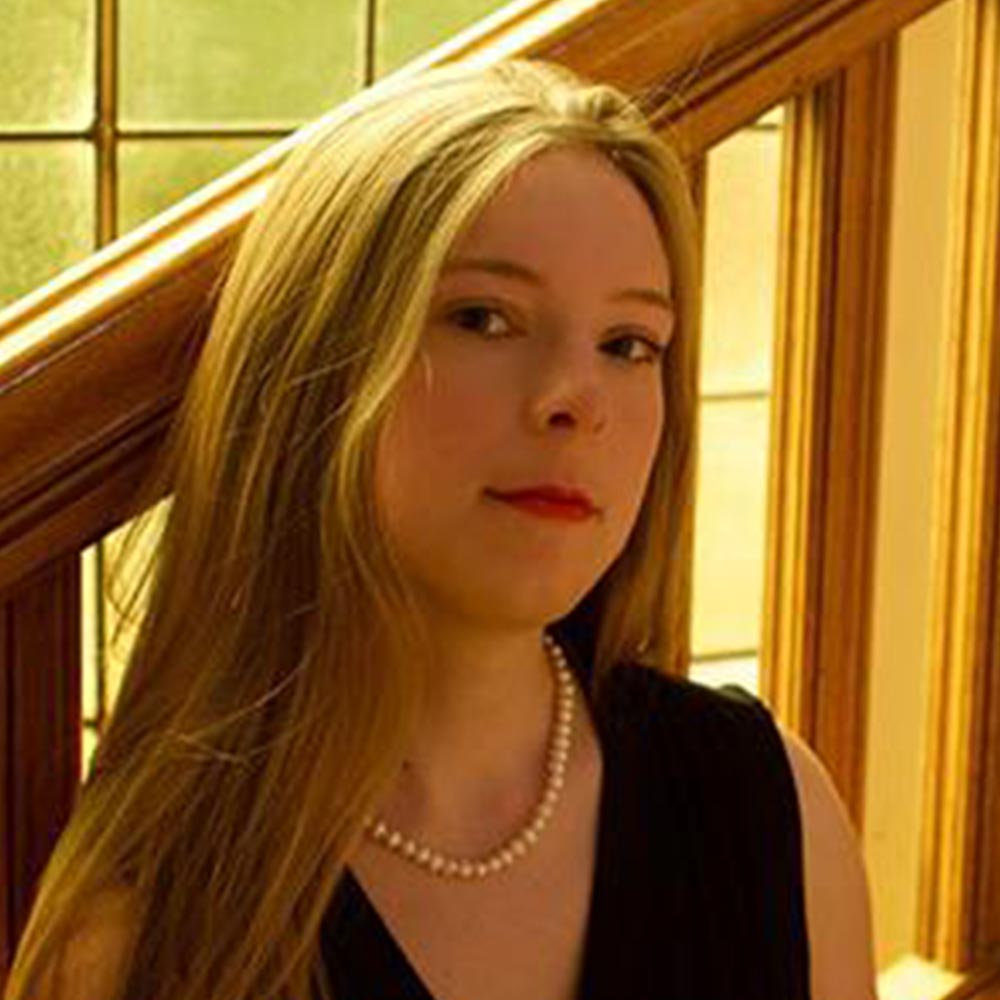
Leigha Amick
Composer Leigha Amick (b.1997) draws inspiration from nature, mathematics, and stories. Her compositions have been performed by ensembles including the Curtis Symphony Orchestra, the Boulder Philharmonic, the Orlando Philharmonic, the Indiana University New Music Ensemble, the Playground Ensemble, NOTUS Contemporary Vocal Ensemble, and the Ars Nova Singers. She has studied at summer programs including the European American Musical Alliance (EAMA), the IRCAM Contemporary Music Creation, and Critique program through CIEE. EAMA awarded her the highest recognition in Counterpoint, Harmony, and Solfège. New Voices Opera recently premiered Rhiannon’s Condemnation: a one-act chamber opera based on a medieval Welsh legend from The Mabinogion for which Amick wrote both the libretto and the music. Amick is an active performer of new music as a violinist and soprano.

Moira Smiley
Singer, composer, song-collector, and IU historical performance program alumnus Moira Smiley (b. 1976) has sung in arenas, cathedrals, kitchens, back porches, sound stages, and on glaciers. She’s performed with the likes of Ladysmith Black Mambazo, Tune-Yards, Tim O’Brien, Eric Whitacre, Los Angeles Master Chorale, New World Symphony, Solas, and The Lyris String Quartet. Smiley’s original compositions, choral arrangements, and folk music are being sung by millions of voices around the world today. As a composer, Smiley is known worldwide for choral arrangements like Bring Me Little Water, Silvy and originals, Stand in That River and How Can I Cry.

Joel Thompson
Joel Thompson (b. 1988) is an Atlanta composer, pianist, conductor, and educator best known for his choral work, Seven Last Words of the Unarmed which was premiered in November 2015 by the University of Michigan Men’s Glee Club and Dr. Eugene Rogers which won the 2018 American Prize for Choral Composition. Thompson is currently pursuing his D.M.A. in composition at the Yale School of Music. In 2017 he was a post-graduate fellow in Arizona State University’s Projecting All Voices Initiative and a composition fellow at the Aspen Music Festival and School. That year he also won the Hermitage Prize. His music has been performed by the Atlanta Symphony Orchestra, Tallahassee Symphony Orchestra, Atlanta Master Chorale, Los Angeles Mas Chorale, EXIGENCE, VocalEssence, and the San Francisco Gay Men’s Chorus. His opera, The Snowy Day, based on the book by Ezra Jack Keats, premiered December 2021 at the Houston Grand Opera.
Notes
Note from the Conductor
When I originally envisioned this program, it was to be performed as part of our tour to New Zealand as part of the 12th World Symposium on Choral Music in July 2020. We were to be ambassadors for our country on the international stage singing music written by a diverse array of American composers. While we were ultimately unable to travel around the globe, we did get to present this music and this program together in February of 2022 as part of the American Choral Directors Association Midwestern Conference at the Harris Theater in Chicago, after we had returned to in-person singing.
And yet since then, so much has changed. We have collectively experienced incredible pain and trauma related to both the COVID-19 pandemic and to a far-too-late reckoning of racial injustice. While this program was conceived in many ways for an earlier time that no longer exists, its music still resonates in this now era, our next normal. To really think about “what is ours” and what we can claim, we must reflect not only on our collective histories, but also on our shared individual stories of suffering, resilience, catharsis, and joy.
And so we sing Carlos Cordero’s plea for aid for a humanitarian crisis in his native Venezuela. We sing Andrea Ramsey’s triumphant struggle to “stomp on the fire” as we move through pain into joy. We sing Reena Esmail’s exuberant prayer for healing, as we are reminded that “we are all Tarana.” We sing with John William Griffith and Breyten Breytenbach of our “first light” in the morning after fog. We sing the words of Idris Caffey and Leigha Amick’s “Night Sky Songs” to quiet and commune with our inner anxieties. We sing Moira Smiley’s hypnotic anthem for connection beyond our devices (somehow written in December of 2019, before we knew how much we would have to come to rely on them). We sing Joel Thompson’s prescient and prophetic hope for a better tomorrow, in the nearly a dozen languages of the high school students who first sang the premiere. And we sing Khashayar Tonekaboni’s words as an immigrant himself, who came to America to find opportunity and a future free of oppression.
And in the middle, we welcome english horn artist Roger Roe to give voice to our collective grieving in the words of his family’s resident poet, Margie McCreless Roe (and with the voices of Roger and his family reading midway through), as they meditate with us on our musings, our masks, and our origins.
This is “music for an America in progress,” yes, as America has always — and will continue to be — in progress. The work of governing ourselves is never done and never to be taken for granted. America is still being built, and we celebrate this glorious, multifarious, colorful, and joyful building with each and every song and each and every story.
— Dominick DiOrio, conductor
Acknowledgments
Funding for this album was provided by an Individual Research Award from the Indiana University Institute of Advanced Study, with additional support from the Indiana University Jacobs School of Music.
Funding for the commissioning of the music for A Chain Is Broken and the poetry upon which it is based, Earth’s Anthem, was provided by an Indiana University New Frontiers in the Arts and Humanities Extraordinary Opportunity Grant.
This album was originally meant to be a celebration of a tour for NOTUS planned to New Zealand in July of 2020, which was unfortunately canceled due to the COVID-19 pandemic. While the recording project was stretched over three years instead of one, the director wishes to gratefully acknowledge the many contributions of time, talent, and treasures by the 31 artists who were meant to travel to Auckland, New Zealand for the 12th World Symposium on Choral Music, but who never had the chance to do so.
